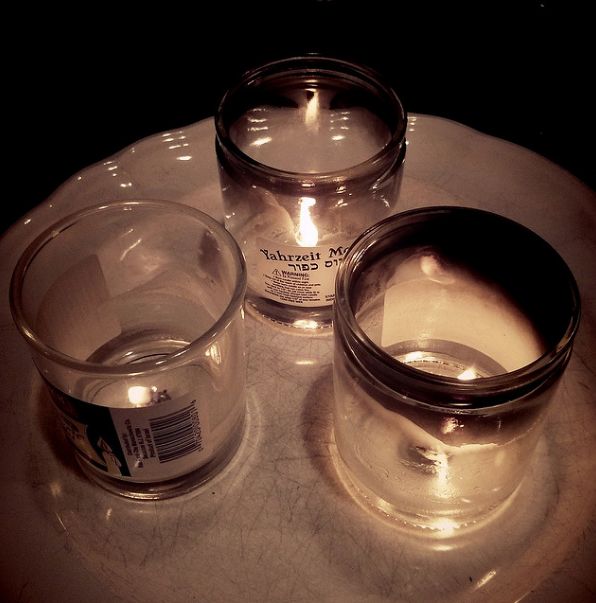The Lilith Blog 1 of 2
October 11, 2017 by Melanie Takefman
The Loneliness of Yizkor When You’re a Young Woman

Photo credit: Kevin Skobac
With the month of Tishrei upon us, the mourners of Zion are in the midst of a Yizkor double-header.
Jewish mourning liturgy is dauntingly public. In most communities, the mourners stand and recite the prayers aloud or silently, while the rest of the congregation exits the room or sits and waits until it’s over.
Reciting the Jewish prayer of mourning, Yizkor, and its sister, Kaddish, has always been a lonely endeavor for me, because I’m a woman and many daily minyans still cater primarily to men. Even though more women have adopted this tradition in recent years, we are nevertheless an anomaly.
There’s another layer to my solitude. I’m always the youngest mourner—by far. I was 21 when my father died. Seventeen years on, I’m still young to be doing this.
I said Kaddish every day for 11 months after my father’s fatal heart attack. In the midst of my anger and confusion at his sudden and inexplicable death, Kaddish seemed one thing I could count on not to drag me deeper into spiraling grief.
I couldn’t attend our family’s Orthodox congregation. I would have been relegated to the back row of the sanctuary behind a fence. That was not my groove. But I found one quasi-egalitarian synagogue in Montreal with daily morning services. I didn’t know anyone there. Needless to say, I was quite the oddity: an opinionated university student among a dozen curmudgeonly, much older men.
In spite of it all, I found solace in Kaddish and an unlikely bond with my breakfast club. My newfound friends stood by me through bawling fits and the awkward moments when they realized I was intruding on their man-talk.
They included me in the minyan, or not—depending on who was leading prayers.
They tried to set me up with the cantor.
In that dim basement chamber, I found my comfort zone.
Later, during my post-university travels and in my first years in Israel, I continued to attend services to say Yizkor and Kaddish on holidays and on the anniversary of Dad’s death. After a polite welcome, I was always met with a variation of shock, sympathy, curiosity and bewilderment.
In Israel, I ended up at several Orthodox synagogues when Dad’s Yahrzeit fell on a weekday, because non-Orthodox synagogues usually aren’t open during the week. The men didn’t know what to say to me, and more than once had to fetch a well-hidden key to unlock the women’s section. At one South American shul, they had to put me outside the sanctuary because they didn’t have a space for women at all. No female had ever attended daily prayers.
This Yom Kippur, Yizkor was especially trying for me. As usual, I ended the service in tears, huge red sunglasses covering my private storm of emotion in the silent sanctuary. I wasn’t crying only because I missed my dad. As I stood among the members of my egalitarian congregation, all of them at least 20 years older than me, I realized how alone I still am.
When I finally escaped to the bathroom to let out my pent-up sobs, I wondered about what other young women in my situation do. Then I realized that I didn’t know any other women in this situation. Not once in my 17 years of mournerdom have I encountered a fellow woman remotely close to me in age reciting Yizkor or Kaddish.
I don’t blame anyone for this predicament; other synagogue-goers mean well. It’s just that it seems we as a people are not equipped to deal with young female mourners.
As Jewish rituals open up to women and our community becomes more diverse, it’s time for us to rethink our perceptions of mourning—and mourners.
We come from different backgrounds, generations and walks of life. Synagogue is not the right place for everyone to mourn, but it can be. The Jewish community should encourage women who choose to recite Yizkor and Kaddish.
What’s more, grief is still largely taboo, even in the age of live-streaming and social media. Let’s be more honest about death. I’d rather people ask me what I’m doing at Yizkor than stare, nod uneasily or ignore me. It’s OK to ask how my father died. It doesn’t make me more upset. I find comfort in talking about him.
I wrote this piece to start a discussion and to reach out to other women in this situation. I’m sure there are many others out there. If we speak up, maybe we won’t feel so alone.
The views and opinions expressed in this article are the author’s own and do not necessarily reflect those of Lilith Magazine.
 Please wait...
Please wait...